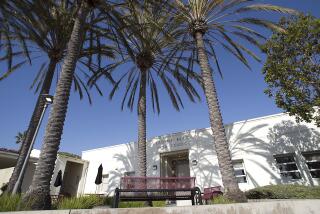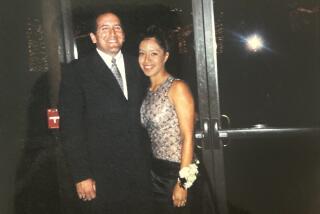Filipino Student Says He May Have Accidentally Spread Computer Virus
- Share via
MANILA — Nervously facing a phalanx of cameras, a Filipino computer student acknowledged Thursday that he may have accidentally unleashed the “Love Bug” virus in what he called an act of “youthful exuberance.” But he refused to say whether he actually wrote the electronic contagion that crippled millions of computers around the world.
The student, Onel de Guzman, who had been in hiding for the last week, surfaced at a news conference at his attorney’s office wearing dark sunglasses and covering his mouth with a handkerchief. Profusely sweating under the glare of television lights, he did not admit or deny responsibility for the virus, and his attorney said de Guzman’s involvement “is one of the questions we would rather leave for the future.” Asked whether he may have accidentally released the virus that crashed electronic mail systems and is estimated to have caused $8 billion in damage, de Guzman, 23, replied, “It is possible.”
“It is possible there was no intention on the part of whoever did it,” de Guzman said in response to another question. “It may just be part of youthful exuberance.”
De Guzman, who lives in a dilapidated public-housing apartment from which investigators believe portions of the virus were unleashed on the Internet, has not been formally named as a suspect by Philippine authorities. But officials say de Guzman and several of his friends at the AMA Computer College in Manila--members of an underground hacking group--have emerged at the center of the government’s inquiry.
In February, the lanky and shy de Guzman proposed writing a program for his senior thesis that computer experts say is eerily similar to parts of the Love Bug. The program he suggested, which was rejected by his dean as illegal, would “steal and retrieve Internet accounts of the victim’s computer.” He would not say at the news conference whether he ever wrote the program, but he justified the concept.
“The Internet is supposed to be educational, so it should be free,” said de Guzman, who whispered his responses to his attorney in Tagalog, the major Philippine language, for translation into English.
Law enforcement officials said Thursday they will summon de Guzman and his older sister, Irene, who shares his apartment, for questioning Friday. But the de Guzmans’ attorney, Rolando Quimbo, said he has not yet received a subpoena. Even if he gets one, he said, investigators will not glean much from his clients.
“I will advise them to exercise their right against self-incrimination,” Quimbo said. “It will not serve the purposes for which they are subpoenaed.”
Quimbo said that even if Onel de Guzman is arrested, law enforcement authorities will face a steep legal challenge because Philippine law does not specifically prohibit the dissemination of computer viruses. “From our point of view, there is no case,” Quimbo said in an interview. “Right now there seems to be no law against this type of activity.”
Officials with the Philippine National Bureau of Investigation have acknowledged the loophole, which is common in many developing countries, but they have said they will attempt to prosecute suspects under a law, designed to combat credit card theft, that forbids use of fraudulent information to obtain goods or services.
Officials believe one or more of the suspects used stolen passwords to connect to an Internet service provider in Manila, which they used as a distribution point for the virus.
“We can bring a case with the existing law, but it would be helpful for us to have new laws,” said Frederico Opinion, the bureau’s director.
In response to those concerns, the speaker of the Philippine House of Representatives, Manuel B. Villar Jr., said he will fast-track a bill that would regulate Internet use and address the issue of viruses.
In comments to the Philippine Star newspaper, Villar said the virus’ authors should have worked equally hard on a legitimate program so they could “get rich and bring recognition to our country.” The virus, which stunned experts with the speed at which it spread, shows that the Philippines possesses world-class information technology skills, he added.
De Guzman, who appeared emotionless but overwhelmed by the intense media attention, has been described by teachers and fellow students as an intense computer enthusiast. He said he spends an average of four to five hours a day using the Internet. He also is a member of GRAMMERSoft, an unofficial student group that sold thesis projects to classmates, created Web sites that disparaged teachers and collaborated on writing viruses.
One written last year was called Myclangelo--apparently a reference to the 1992 virus called Michelangelo--which piqued the attention of programmers outside the Philippines. That virus and the Love Bug contain a reference to GRAMMERSoft.
Investigators are questioning the group’s eight other members. College officials believe that one of them, Michael Buen, who graduated last week, wrote a thesis on creating multiple file copies that also could be related to the Love Bug.
De Guzman said he had discussed his password-stealing thesis with GRAMMERSoft members, and his lawyer suggested that some of them may have participated in writing the virus. “We can go as far as saying that he did prepare the thesis proposal,” Quimbo said. “But the knowledge of its contents were not limited to Onel.”
The virus, which was attached to e-mail messages with the subject line “I Love You,” automatically sent copies of the message to everyone in a user’s electronic address book, clogging the e-mail systems of many businesses. The virus also attempted to fetch another program from a Web site in the Philippines that would search computers for Internet access passwords and e-mail those passwords back to an address here.
Some investigators believe the virus was distributed in an effort to gather passwords from computer users in the Philippines but that it mushroomed out of control. Asked for his thoughts on the intent of the author, de Guzman said he believes the writer had “no intention of causing harm.”
The 30-minute news conference--which was called to an end because Quimbo said de Guzman has a “weak heart” and “his head was aching”--featured liberal doses of “no comment” from the lawyer and the student. De Guzman, for instance, would not say whether there had been a personal computer in his apartment and, if there had been, where it is now. Investigators who searched the apartment Monday said they did not find a computer, although they did seize computer diskettes and other computer-related items.
De Guzman also said he could not remember where he was on May 3, the day the virus was unleashed.
More to Read
Sign up for Essential California
The most important California stories and recommendations in your inbox every morning.
You may occasionally receive promotional content from the Los Angeles Times.













